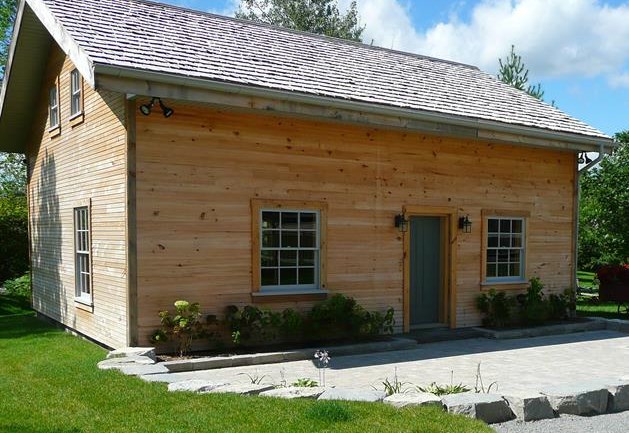Petch House, one of the oldest residences in Aurora, has stood almost silently since it was restored and reconstructed behind the Aurora Seniors’ Centre nearly eight years ago.
From a tourism centre to a simple storage space, there has been no shortage of ideas on what to do with the building, but one previously floated idea is gaining traction once again: a wedding chapel.
“Since the town assumed ownership of the cabin, it has remained empty until a new use could be determined,” said Carlson Tsang, planner for the Town of Aurora, in a memo to this month’s meeting of the Heritage Advisory Committee (HAC).
Council asked staff to look into the feasibility and cost of transforming the log cabin into a wedding chapel for municipally conducted wedding services that are usually carried out in council chambers.
“The Building Division indicates that it would be possible to convert the building into a wedding chapel as it presently exists with no upgrades on a conditional seasonal basis,” said Tsang. “If the building were used for wedding ceremonies on a year-round basis, it will need to be upgraded with electrical facilities and an HVAC system to comply with Ontario Building Code requirements. These recommendations were communicated to council…and council deferred the item and requested staff to obtain comments from the HAC prior to making a final decision.”
On HAC’s first crack on the wedding chapel option, questions were raised on what the interior impacts might be if HVAC is installed in the historic building, whether the chapel would require a washroom facility, the impact on parking at the Aurora Seniors’ Centre, and cost.
The work that has carried on to this point has found that HVAC will only be required if marriage ceremonies are carried out year-round; that the average attendance at a municipal marriage ceremony is about five people and would have minimal impact on parking; and that a washroom facility would not be required if weddings take place during normal town hall business hours.
Electric lights to equip the facility would cost approximately $15,740 and HVAC $20,987.
“The town is currently partnering with the Canadian Food and Wine Institute for a joint wedding program to use the Armoury building as an alternative location for marriage ceremonies,” Tsang noted. “The program is anticipated to launch in April 2021. The fee for the service at the Armoury building starts at $1,000 which includes food, décor and photography. However, this program was developed based on a cost recovery model where the town would only recover an officiant fee of $125 per service.
“If the Petch House can be used as a wedding chapel, the town can collect the regular fee of $500 per service, which is $375 or 75 per cent more than the joint program with CFWI. This not only generates more revenue for the town but also provides a more affordable option to the public. Given that Petch House can be booked more easily than the council chamber, the Town would be able to increase the frequency of its services to meet increasing demand.
At the latest HAC meeting, some of the concerns addressed earlier remained persistent.
“Petch House has been an item for council’s deliberations for at least 15 years, perhaps longer,” said former councillor Bob McRoberts, a longtime HAC member. “If there is no washroom, people are to be escorted to town hall. In my mind, if someone has to go to the washroom, especially if there is a youngster involved, that is quite a distance. Perhaps another option would be to impose on the Seniors’ Centre washroom.”
But fellow committee member Neil Asselin questioned the costs required to have a wedding chapel as the next chapter in Petch House’s history.
“I would hate to put more money into a money pit,” he said, noting additional costs required under the Ontario Building Code.
Brock Weir is a federally funded Local Journalism Initiative reporter at The Auroran



